
Washing Machine Smells Like Sewage? (here’s why & what to do)
Is there an unpleasant smell coming from your washing machine? If the odour is so foul that it smells like sewage, then you have to act fast and determine exactly what’s causing this issue.
Most likely, the reason why your washer smells horrible may be due to bacterial build-up, using too many laundry products, not using hot water, or a more serious issue that may need a professional’s guidance.
Let’s go over each of the likely causes of the smell and how you can deal with it in this article.
The Washing Machine Needs A Clean
Washing machines exist to help us clean our clothes. But that doesn’t mean that they don’t need TLC, either.
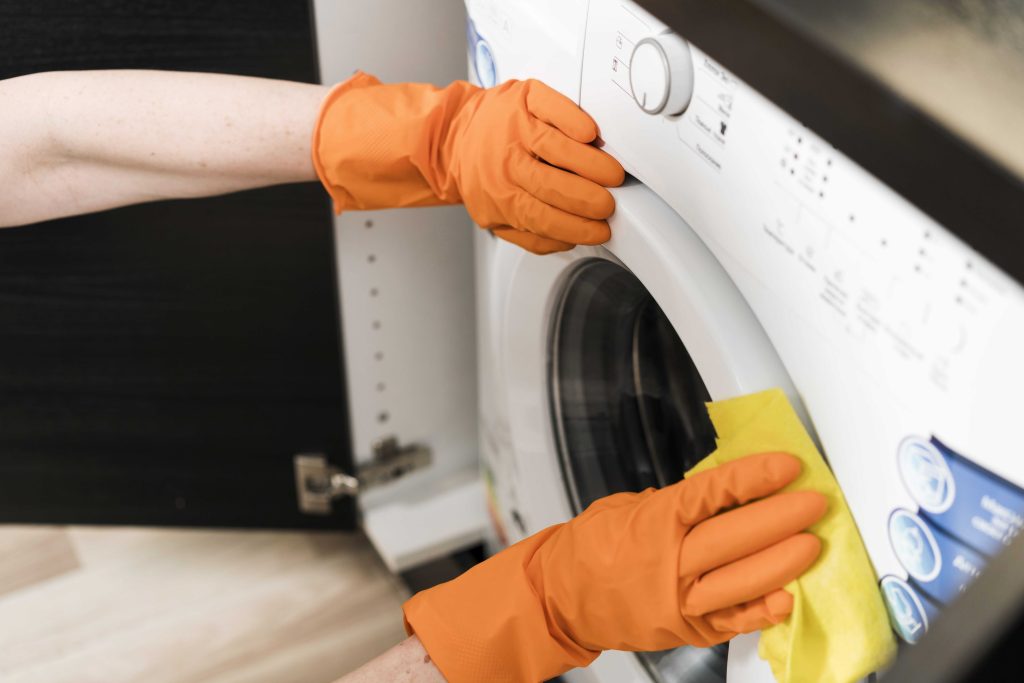
When we put our garments in the washer, most of the time dust, hair, bacteria, dead skin cells, and other substances also come with the fabrics. After all, we wear our clothes everywhere, and it’s not surprising that they will be dirty and hence, need a wash.
Our washing machines will clean the laundry, but it’s unavoidable for dirt and other substances to remain in the appliance, especially in the drum. When this happens, bacteria and germs will grow – causing a foul smell.
What You Can Do
Schedule a regular washing machine cleaning session. There are a lot of benefits to wiping and running an empty cycle in your washer once or twice a month.
Doing so will not only get rid of the odour, but will also make your washer do its job more efficiently.
Using Too Much Laundry Product
Laundry detergents, fabric softeners, pods, and other laundry products are designed to make our clothes clean and fragrant. Unfortunately, they can also be the reason why our washer (and clothes) may now be smelling like rotten eggs.
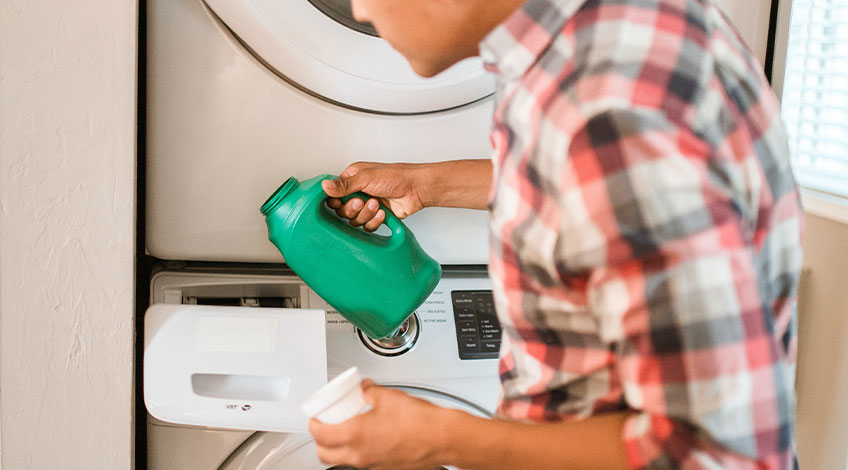
The chemicals from laundry products often dissolve in the water once the washer’s cycle starts. However, if you’re using too much of the recommended amount, then it’s likely that there will be excess residue that will get stuck inside your machine. Over time, this residue will grow bacteria and fungi, and even trap hairs and dirt that would cause the bad smell.
What You Can Do
Read the packaging of the laundry product you’re using. Make sure to follow the instructions on how much you’ll need to use, which will primarily depend on your laundry.
Also, use appropriate laundry products. If you have a High-Efficiency washer, use detergents that are formulated for HE machines.
No products found.
TIP: Use natural alternatives! Distilled white vinegar is a great substitute for fabric softeners and will leave your fabrics smelling nice and fresh.
Always Using Cold Water
As mentioned earlier, laundry products like detergent and softeners are meant to dissolve once the cycle in the washing machine starts.
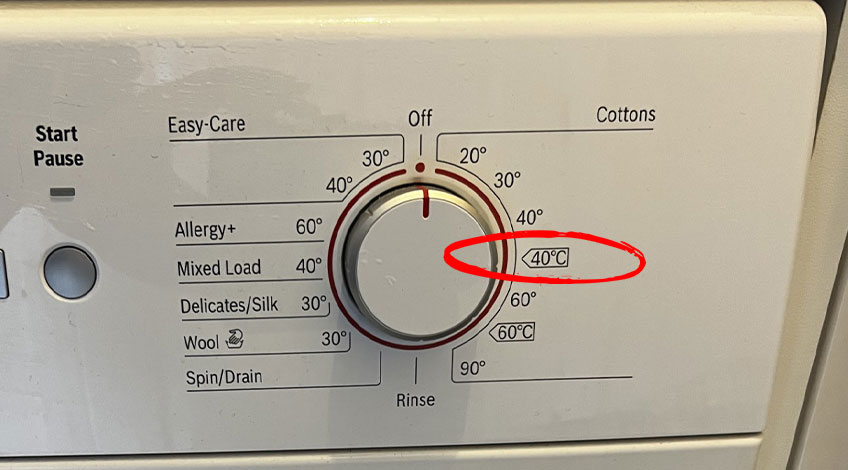
However, if you’re only using cold washes, which are usually 40 degrees Celsius or less, this will increase the possibility of the laundry products not fully dissolving in the cycle, and may even clump together. The result? A smelly machine.
What You Can Do
Use hot washes, which are at least 60 degrees Celsius, in your washing machine now and then. The heat in the water can remove residue buildup, mineral deposits, and even kill bacteria and fungi.
Of course, if you’re always washing delicate garments that cannot hold against high heat, it’s best to run a separate hot empty cycle instead.
Mould And Mildew Growth
Fungi thrive in damp environments. Know what appliance is often damp? That’s right, your washing machine.
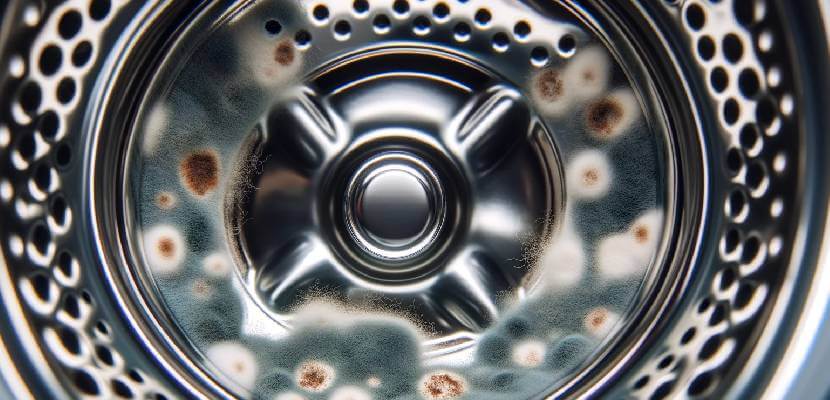
If the smell is so foul in your washer that it’s also affecting your newly-washed fabrics, then there’s a chance that fungi are already growing in your washer, specifically the drum or its rubber parts like the door seal or gasket.
Inspect your washer for signs of fungi growth. They may appear as black or brown spots and patches in the machine.
What You Can Do
Wipe your washer with a solution of white vinegar and warm water to kill the fungi.
To prevent mould and mildew growth, open the door of your washing machine and air it out after every use. This will ventilate the drum and make it an unlikely environment for harmful mould.
Plumbing Issues
In some cases, the issue behind the awful smell in your washer may be due to your plumbing or drainage system.
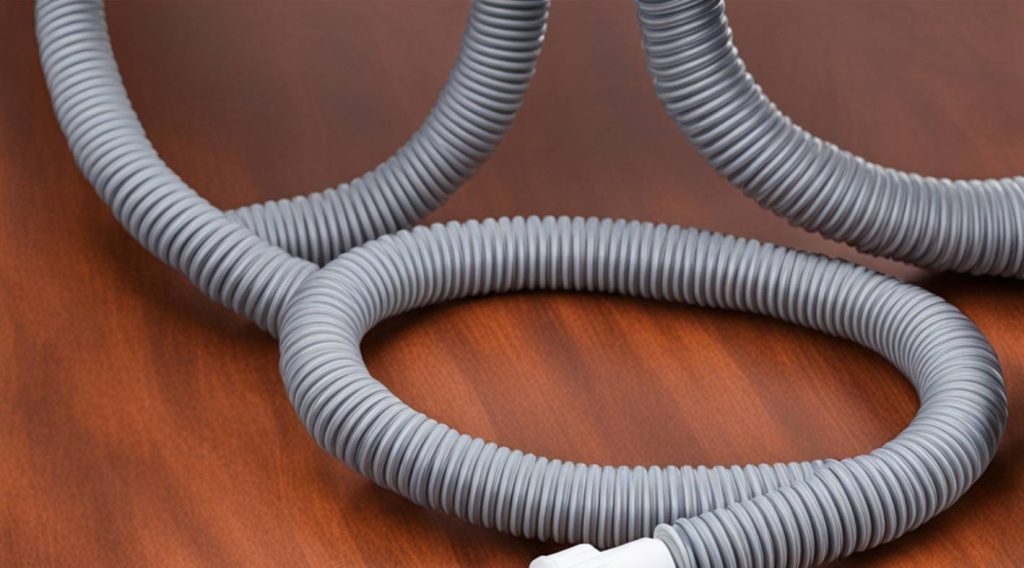
When the moisture in your washer’s pipes and vents cannot drain properly, it will get stagnant and over time release an awful smell.
What You Can Do
Unclogging drains and pipes may need a professional’s touch. After all, it’s easy to damage your washer if you mistakenly deal with the wrong part.
If you want to DIY, make sure to read the user manual of your machine first. Familiarise yourself with the specific parts and follow the instructions for troubleshooting.
WARNING: In some cases, the smell may be due to a leaky gas pipe. This is a huge safety risk that requires prompt action from a professional and the emergency services.
The Washing Machine Needs Maintenance
Do you have an older or overused machine? In this case, it’s likely that there are parts that are already faulty and need fixing.

As years pass, it’s sadly normal for a washer to have faulty parts due to wear and tear. If it’s not damaged, you may have to have the washer professionally cleaned, as your regular cleaning sessions may not be enough to keep awful smells out.
What You Can Do
Schedule a yearly maintenance check and cleanup from a professional technician. They will check your washer from top to bottom, and clean it thoroughly.
Doing a routine checkup will extend your washer’s lifespan and save you money in the long run. After all, when you immediately have a faulty heating element replaced as it was discovered early, you won’t have to deal with other issues that a delay may cause.
How To Clean A Washing Machine – The Simple Way
The main solution to getting the foul smell away from a washer is a thorough cleaning.
We always recommend that a washing machine is best cleaned regularly, at least once a month.
You Will Need:
- Rubber gloves
- Distilled white vinegar
- Washing up liquid
- Bicarbonate of soda
- Clean microfibre cloth
- Soft-bristled brush (old toothbrush will do)
- Vacuum or broom
TIP: Before anything else, read the user manual of your machine for the do’s and don’ts. Some washers have special parts or may require extra care.
- Empty the washer and start an empty hot water cycle. Add 1 to 2 cups of white vinegar to the fabric softener dispenser. You can also use a cup of bicarbonate of soda and put it in the drum if you want a vinegar alternative.
- Once the cycle is finished, dampen the microfibre cloth with warm water and wipe the interior of the washing machine. You can also mix equal parts of white vinegar and water to wipe and get rid of bacterial and fungal growth.
- Remove the detergent drawer if it’s replaceable, and scrub it under warm soapy water and a bit of washing up liquid. Use the soft-bristled brush for hard-to-reach corners. Air dry the drawer before putting it back in.
- To remove any remaining vinegar residue, run an additional rinse cycle using hot water. Leave the door open and allow the interior of the washing machine to air dry completely. This helps prevent mould and mildew growth.
- Unplug your machine and dampen your microfibre cloth. Wipe it from top to bottom, and don’t forget to focus on the control panel’s buttons and knobs.
- Finally, use a broom or vacuum to clean the area around your washer, especially under the appliance itself.
SEE ALSO: How To Clean A Washing Machine Like A Pro: Quick & Easy Guide
Other Tips To Avoid Having A Smelly Washing Machine
Before we end this guide, here is some bonus information that will help keep your washer smelling fresh and clean:
- Remove wet clothes and let them dry as soon as they’re done in the wash.
- Make sure your washer is level as a tilted one may not dispense detergent properly.
- Use descaling products if you live in an area with hard water.
And there you go! With a bit of patience and effort, you can get rid of that sewage smell in your washer for good!
Do you have questions? Feel free to leave a comment below.
SEE ALSO: What Causes Black Mould On Washing Machines? (how to remove it)
Frequently Asked Questions
To get the sewer smell out of your washing machine, you’ll need to regularly clean its interior and exterior. It’s best to run an empty hot wash cycle to remove the bacteria and fungi that are likely causing the awful smell.
There are many possible reasons why your washer may smell like sewage, such as a bacterial or fungal buildup, not doing hot washes, using too much laundry products, or plumbing issues and faulty parts.
To stop your washing machine from smelling like rotten eggs, clean it regularly, run an empty hot wash, and have it professionally inspected at least once a year.
Also, follow us on Pinterest ...



